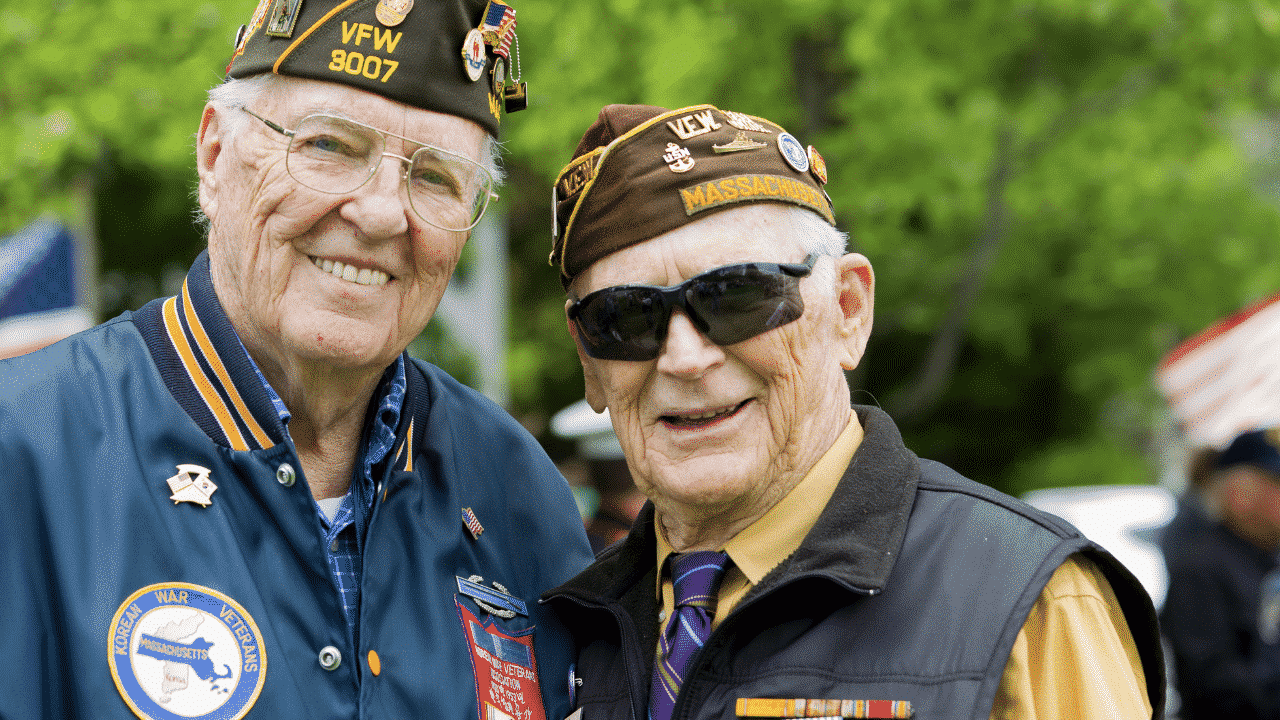You may be surprised to hear that about half of today’s Veterans are 65 and older.
Chances are, if you’re caring for an aging parent (65 or older) who served in the military, their service was influenced by WW-II, the Korean War, or the Vietnam War.
Offering the opportunity for your aging parents to share about their military experiences in a healthy, loving, and non-judgmental space is so important. It helps to challenge the stigma of having served in war.
These conversations help to more equally distribute the heavy burden of war and military service from the shoulders of soldiers to the larger body of society. These conversations also help to chip away at the shame plaguing many Veterans and maybe, just maybe, can help them to move one step closer to finding a sense of inner peace.
When this conversation happens, and I hope it does, here are…
6 Tips for Talking with Older Veterans About Military Experiences
Tip #1: Create a space to talk, but don’t force it.
Let your parent know that all aspects of their life are important, the positive and the painful, and ask if they’d be willing to share about their military experiences.
Don’t expect this conversation to happen in public. Private is best! Here’s why. Military experiences can be very emotional and as with anything emotional, people don’t want to be vulnerable in public. Consider sharing a meal together and allow the conversation to happen naturally. Or, do an activity together, like take a walk or a hike, work on a puzzle together, and then ask if they’d be willing to share.
Don’t force it! Say you do extend the invitation to talk and your parent says no directly, like, “oh hell no, I’m not sharing this with you or anyone for that matter”, or indirectly, like they simply change the subject. Don’t force it. Respect your parent’s boundaries and drop it for now.
Tip #2: Let your parent tell their own story.
If your aging parent is open to talking about military experiences, allow them to tell their own story and at their own pace. Your parent might jump around, say things that confuse you, or mix up the timeline. Be open and let them talk. Often when people are talking about something emotional and painful, it can take time to get to the point. Give your parent the space and grace to ground themself in the midst of what might have been a very chaotic time in his life.
Your parent probably won’t say everything in the first conversation. Veterans who have experienced war, or other traumas, often want to protect their loved ones from the atrocities they witnessed or were a part of. If you have the sense that your parent is holding back, respect that this is their boundary and don’t push it! It may take a few conversations for your parent to get out what they want to say, or they may never say it at all. This is your parent’s story to tell in their own way. Respect this!
Tip #3: Be an active listener.
This is your parent’s opportunity to give, and your opportunity to receive. As your parent shares experiences and memories, you may feel compelled to jump in, ask lots of questions, and clarify things. Being an active listener takes practice and is incredibly powerful in helping to build trust and connection.
Here are some DO’s and DON’Ts for active listening
when it comes to military experiences
DO be patient
DON’T interrupt
DO paraphrase on occasion [like, “let me see if I have this right… (then give a summary)”]
DON’T jump ahead and make assumptions
DO give little prompts (like, “then what happened?”, “what happened next?”, “How was that for you?”)
DON’T ask “why” questions (like “why did you do that?”)
DO reflect meaningful and emotional points (“wow this must have been so hard for you”, “what a complicated time in your life”, “how painful”)
DON’T be an expert over your parent’s experience (don’t say things like, “you should have done [this] instead”, “you should have done [this- gotten help] when you got out of the military, things would have been so different”)
DO be open and curious
DON’T dig and pry.
DO be empathic (“this must have been so hard for you”, “you endured so much loss”, “this sounds like it was so overwhelming”)
DON’T say things like, “this happened so long ago, you should be over it by now”.
DO be appreciative (“thanks so much for sharing your experiences with me”, “I feel so much closer to you knowing more about your life”)
DON’T end the conversation without acknowledging your parent and how meaningful what they shared was.
Tip #4: Harmonize with the sadness and the strength.
In other words be empathic!! Being empathic will help to reinforce the security of the bond between you and your parent, and will help your parent find comfort in the midst of what might be a painful and scary conversation.
This is especially true for Vietnam Era Veterans who returned home from Vietnam only to be ridiculed and scorned. Not to mention the countless stories of African American Vietnam War Veterans who have struggled to reconcile the cruel irony of fighting for human rights, only to return home to the US and be denied the very rights they were sacrificing their own lives for.
As you can imagine, war is filled with unimaginable atrocities. Casualties of war are quantified not only in human lives, but human psyches and souls. Veterans who served in the Vietnam War (as with other wars) are at risk for post traumatic stress disorder (PTSD), depression, anxiety, panic attacks, substance use, relationship problems, estrangement from family, and the list goes on. This of course, affected us, the next generation. That’s why it is essential that if your parent shares their experiences with you, that you…
Meet your parent with empathy- this small gesture, can begin (inch by inch) to heal the unimaginable wounds deep inside many Veterans.
Equally important is to acknowledge the incredible strength and resilience it takes to carry on in the midst of crisis and chaos, and the courage it takes to talk about deep pain and emotional turmoil, even 45, 65, or 75 years later.
Tip #5: Manage your own feelings as they come up.
Some of the things your parent shares may be hard to hear. You may be surprised to find yourself feeling anger, fear, disgust, sadness, confusion… whatever feelings come up for you, it’s important to acknowledge them, and manage them.
Don’t allow your reactions to overshadow your parent’s experience.
If you want to share a thought or feeling of your own, please, please, please use “I” statements. One healthy way to manage and process these feelings is to talk with someone you trust about what came up for you AFTER this conversation is over. It may help to remember that… As hard as it may be to hear some of your parent’s experiences, these experiences were harder to have lived through.
Tip #6: Be accepting of your parent
If your parent takes the risk to open up to you, please meet them with love and acceptance.
It’s an incredibly vulnerable thing for a Veteran to share their military experiences, especially if they experienced combat or other traumatic events. Military culture is well-known to be rigid, punitive, and shaming, especially when it comes to being vulnerable.
As a result, Veterans might second guess themselves when talking about even the most minor military experience, not to mention something deeply painful. With all of the criticism and judgement that Veterans have faced, especially Vietnam Era Veterans, giving your parent love and acceptance will help to validate their experience, build trust between you, and help to heal some very deep wounds.
Help Your Aging Parent to Get Support! (It’s NEVER too late!)
If you’re worried that your Veteran parent may be experiencing post-traumatic stress disorder (PTSD), depression, anxiety, panic attacks, substance use, relationship problems, or any other mental health problem, please help your parent to get mental health care. One way to do this is by enrolling in their local VA and requesting mental health services.
Here’s crisis line information for Veterans. Please know that your Veteran parent does not have to be enrolled in the VA to call the crisis line for support!
Please share this video with your friends who are caring for their aging military parents.
Additional Resources for Older Veterans & Caregivers
- Benefits & Resources for Older Veterans: https://www.benefits.va.gov/persona/veteran-elderly.asp
- VA Caregiver Support Resources: https://www.caregiver.va.gov/
- Health Topics for Older Adults: https://www.va.gov/GERIATRICS/pages/Health_Topics_For_Older_Adults.asp
- Home-Care & Community-Based Services: https://www.va.gov/GERIATRICS/pages/Home_and_Community_Based_Services.asp
- Veterans Paying for Long-Term Care: https://www.va.gov/GERIATRICS/pages/Paying_for_Long_Term_Care.asp
- Residential & Nursing Home Care: https://www.va.gov/GERIATRICS/pages/Nursing_Home_and_Residential_Services.asp







